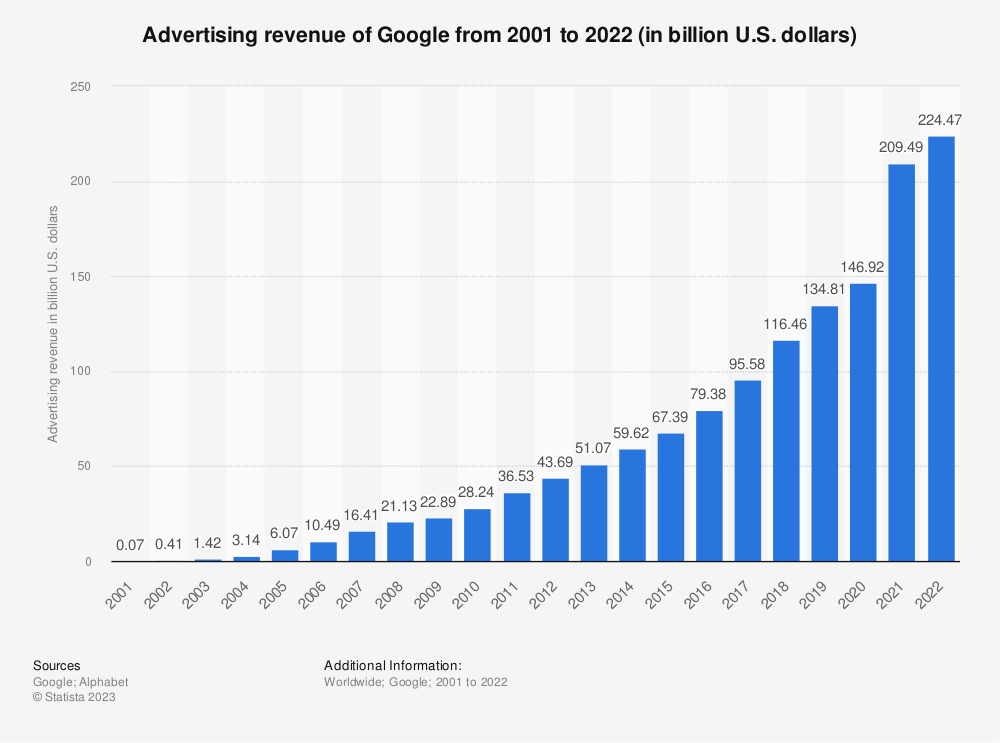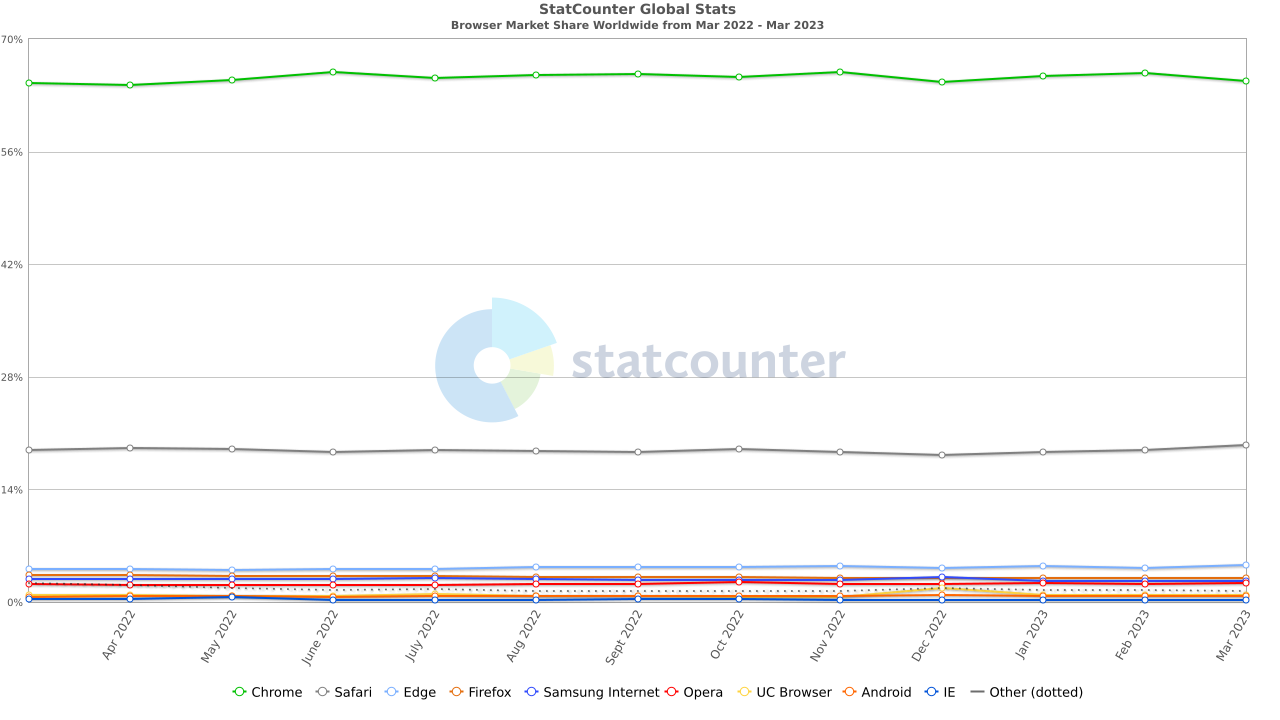Many of us couldn’t imagine a workday – or any day – without using the Internet. For something so essential to our lives, web regulations remain largely stagnant. Marketers have enjoyed these freedoms and used the access to connect and build relationships with their audiences.
Then, waves of new privacy regulations were introduced, large tech companies like Apple started tightening their privacy measures, and the imminent crumble of the Third-Party Cookie progresses each day. Now, many in the field are scrambling for something new to measure the effectiveness of their marketing campaigns, especially when targeting an HCP audience.
A Time of ‘Just Desserts’ for Marketers
In the past two decades, we’ve witnessed unprecedented growth in online advertising [Fig 1]. With little regulation, the Internet was a limitless playground for digital marketing and advertising. Cookies became a fundamental resource for following personal user journeys online.
[1] [Fig 1: The unprecedented growth of online advertising 2001 – 2022. Source: Statista, 2023]
What is a ‘Cookie?’
Cookies are pieces of code that track a user’s journey on a website. Cookies can assist our web browsing experiences like storing language preferences or remembering items a user has placed in a shopping cart (first-party cookies). Some cookies can track our online behaviors and report these digital patterns (third-party cookies). Online Behavioral Advertising became a strategic tool for digital marketers and advertisers looking to target individual users based on first or third-party data. Users could be tracked across several unique sites, retargeted, and ultimately served highly-targeted ads.
Privacy, Please!
As internet and mobile network usage increased, so did the concern for privacy. Users noticed their information was being tracked. Many became concerned when ads for something they had just searched for started popping up on their devices. At the same time, reports of data leaks and the misuse of personal data made their way into headlines.
To protect users’ privacy and provide transparency over how their information is being used, especially in sensitive sectors like healthcare, where HCP audiences are a key focus, policies like the EU’s General Data Protection Regulation (GDPR) and the California Consumer Privacy Act (CCPA) have gone into effect. These laws aim to give users in the EU and consumers in California, control over what companies can collect about them online. It requires informed consent before storing non-essential cookies on a user’s device.
In addition to government regulations, brands have stepped up to advocate for users’ privacy, too. In 2017, Apple introduced Intelligent Tracking Prevention (ITP) on its web browser, Safari, and disabled the use of third-party cookies by default. Updates to ITP limited client-slide tracking to 7 days or 24 hours, depending on the cookie. Apple also unveiled its App Tracking Transparency (ATT) framework. ATT requires app developers to receive users’ permission before tracking and sharing their user identifiers. This includes Identifiers for Advertisers (IDFA) like Apple’s mobile ID, which facilitates in-app advertising and measurement.
Mozilla’s Firefox followed suit and introduced Enhanced Tracking Prevention (ETP) to provide simple content-blocking settings that users could manage themselves. Tech-giant Google, which is said to have roughly 65% of the browser market share, aims to make third-party cookies obsolete this year. [Fig 2]
[Fig 2: Google Chrome is virtually unchallenged as the leading web browser. Source: Statcounter, 2023]
How Should Marketers Prepare for A ‘Cookie-less’ Future?
Cutting out cookies from our digital advertising diets may be challenging, but there are plenty of alternatives that are just as sweet. With the rise of digital media and streaming services, audiences are consuming all kinds of messaging on various platforms. It’s a great time to invest in multi-channel marketing strategies. Consider strategies that get the right message, to the right audience, such as an HCP audience – at the right time.
Beyond email, direct mail, and social media, new channels like ConnectedTV and Over the Top (OTT) are gaining traction. As the digital world evolves, new concepts like Programmatic Advertising are proven, valuable solutions. Programmatic Advertising is an optimized approach that high-functioning marketing teams can count on when cookies are suddenly ‘out of stock.’
Marketers should consider alternative methods for measuring success. A significant competitive advantage for marketers is proprietary data sources. Solidifying proprietary data sources will deepen engagement across marketing channels. To access proprietary data sources, motivated marketing teams need a data partner to help them reach their target audience and grow their business.
Consider other key identifiers in the healthcare industry like National Provider Identifier Numbers (NPI#), a 10-digit numerical identifier issued by the federal government to HCPs. NPI#s are used to identify HCPs in HIPAA-compliant healthcare transactions like submitting claims or prescribing medications and treatments. Type 1 NPI#s are assigned at the practitioner level to all physicians and mid-level providers. Type 2 NPI#s are assigned to groups like hospitals, nursing homes, pharmacies, and more.
A More Focused Approach:
ICD-10, Rx, and CPT codes are some of the many coding mechanisms used by HCPs to streamline the medical billing cycle. Identify the right audience for your next campaign by creating a complete picture of HCPs using insurance claims data, prescribing habits, and demographic information. With smarter targeting methods, it’s never been easier to access higher-quality HCP data at scale.
Redi-Data is a trusted source providing targeted healthcare, consumer, and business data.
Redi to Serve You!
At Redi-Data, privacy and data quality are our top priorities. Our digital identity solution, Redi-Data Digital, will further boost your marketing campaigns with premium services like the ability to create custom segments. Expand your reach to an HCP audience across digital platforms like programmatic, search, mobile, social media, and more.
Our data partners include industry-leading membership groups and professional associations including the American Medical Association (AMA). We also partner with independent third-party not-for-profits, like BPA Worldwide, to validate audience data.
To learn more about how Redi-Data can help you grow your HCP marketing, contact us at sales@redidata.com or 973.227.4380.
Sources:
Fig 1 – https://www.statista.com/statistics/266249/advertising-revenue-of-google/


